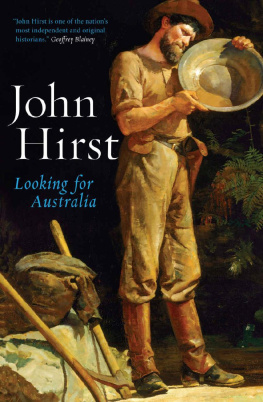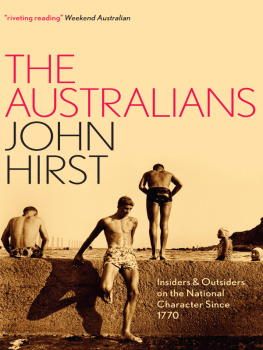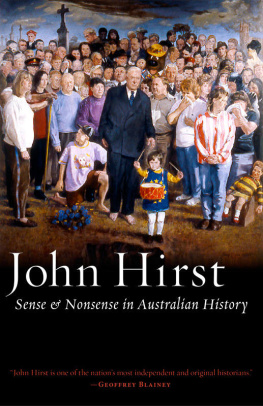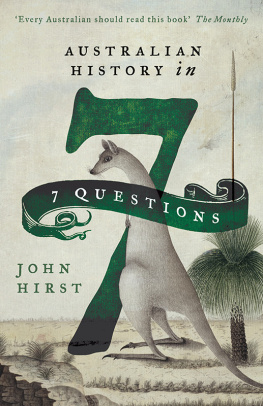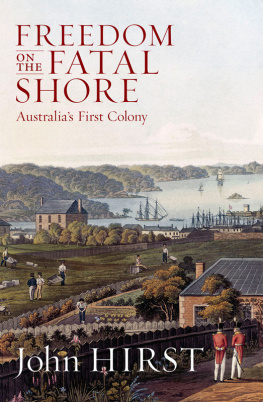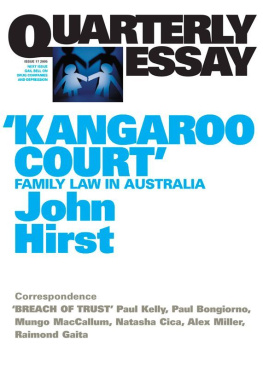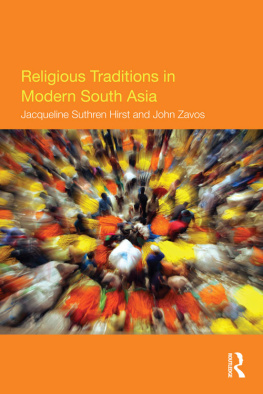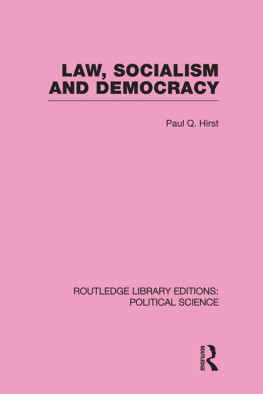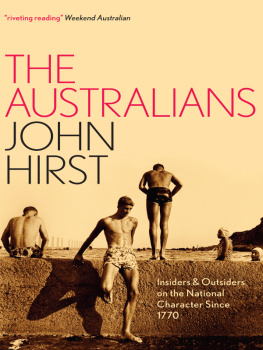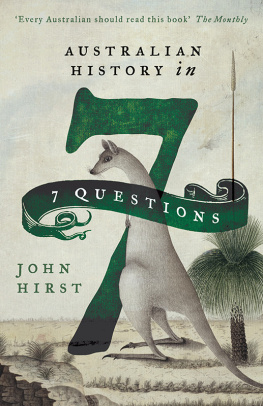John Hirst - Looking for Australia
Here you can read online John Hirst - Looking for Australia full text of the book (entire story) in english for free. Download pdf and epub, get meaning, cover and reviews about this ebook. year: 0, genre: History. Description of the work, (preface) as well as reviews are available. Best literature library LitArk.com created for fans of good reading and offers a wide selection of genres:
Romance novel
Science fiction
Adventure
Detective
Science
History
Home and family
Prose
Art
Politics
Computer
Non-fiction
Religion
Business
Children
Humor
Choose a favorite category and find really read worthwhile books. Enjoy immersion in the world of imagination, feel the emotions of the characters or learn something new for yourself, make an fascinating discovery.
- Book:Looking for Australia
- Author:
- Genre:
- Year:0
- Rating:4 / 5
- Favourites:Add to favourites
- Your mark:
- 80
- 1
- 2
- 3
- 4
- 5
Looking for Australia: summary, description and annotation
We offer to read an annotation, description, summary or preface (depends on what the author of the book "Looking for Australia" wrote himself). If you haven't found the necessary information about the book — write in the comments, we will try to find it.
Looking for Australia — read online for free the complete book (whole text) full work
Below is the text of the book, divided by pages. System saving the place of the last page read, allows you to conveniently read the book "Looking for Australia" online for free, without having to search again every time where you left off. Put a bookmark, and you can go to the page where you finished reading at any time.
Font size:
Interval:
Bookmark:

Published by Black Inc.,
an imprint of Schwartz Media Pty Ltd
Level 5, 289 Flinders Lane
Melbourne Victoria 3000 Australia
email:
http://www.blackincbooks.com
Copyright John Hirst 2010
ALL RIGHTS RESERVED.
No part of this publication may be reproduced, stored in a retrieval system, or transmitted in any form by any means electronic, mechanical, photocopying, recording or otherwise without the prior consent of the publishers.
Every effort has been made to contact the copyright holders of material in this book. However, where an omission has occurred, the publisher will gladly include acknowledgment in any future edition.
The National Library of Australia Cataloguing-in-Publication entry:
Hirst, J. B. (John Bradley), 1942
Looking for Australia / John Hirst.
ISBN: 9781863954860 (pbk.)
Social history.
AustraliaPolitics and government.
AustraliaSocial conditions.
306.0994
Book design by Thomas Deverall
Index by Michael Ramsden
Nation-states are under threat. Their boundaries are said to be fraying in a global world. In the academy, the unities they claim to embody have been assiduously unpicked. The critics insist that nations are divided by class, ethnicity and gender (among other things) and the experience and preoccupations of each group will be different and distinctive. Claims about national values or identity are not only misleading but oppressive. What does a bushman mean to a woman? What can Gallipoli mean to an African refugee? What exactly is un-Australian behaviour?
The differences within nations are real and worthy of study, but are we finally to say that Japan is a nation divided by class, ethnicity and gender and Australia likewise is divided by class, ethnicity and gender and nothing more? That there is no national culture and identity that distinguishes Japan from Australia? If you seriously believe this, you could try acting in all situations in Japan as you do in Australia. You could call everyone mate. The guidebooks dont recommend it: RESPECT. Its the fundamental element of Japanese culture and if you remember to respect your hosts, your boss, your elders and, in fact, everyone you meet, you cant go wrong.
I still want to talk about Australia as a whole, as a nation-state, a political culture, a people with distinctive values, a certain style and idea of themselves. The essays reprinted here were written in pursuit of this aim. Most of them have appeared since my first collection of essays, Sense and Nonsense in Australian History, was published in 2005. A few older works have been included when they relate to the themes explored here. The sources of all the essays are given at the end of the book.
The essay Was Curtin the Best Prime Minister? was written for this collection. My research on Curtin was supported by a fellowship at the Australian Prime Ministers Centre at Old Parliament House in Canberra. I also had a very fruitful visit to the John Curtin Prime Ministerial Library at Curtin University in Perth where the staff were most helpful and hospitable, though they knew I was questioning Curtins pre-eminence. In querying Curtins record I am drawing on and adding to the work of a number of historians, Peter Charlton, Peter Edwards, Graham Freudenberg, David Horner, John Robertson, Peter Stanley and the most recent Curtin biography by David Day. The criticism from the experts has been mounting up, yet without Curtins status as best prime minister being questioned. John Edwards criticises Curtin as a wartime leader but thinks his record in post-war reconstruction is enough to justify his pre-eminence, a claim I disagree with but have not pursued here. The Curtin essay has no footnotes, but scholars who want information about my sources can enquire through the publisher.
John Hirst
Are the finest guides to Australian history always those written by historians? Asked to name the best history books on Australia, I find my mind wanders to works that are not history proper. Is this because our historians have been poor, or because Australia doesnt yield its secrets when the usual methods are applied?
At the 2006 summit called by the Howard government to discuss the teaching of Australian history in schools, I signed up to the proposition that children should, among other things, know significant public events and developments. But is knowing them the way one comes to know Australia? In the United States or England, the public events of the past still definitely shape the nations sense of itself. Americans are, as their Declaration of Independence avers, committed to liberty and the pursuit of happiness. The English are proud of creating the mother of parliaments and the protections of the common law. And in France, for a long time, a persons attitude to the Revolution determined which of the towns chess clubs they would join. Our history hasnt worked like this.
Two days after the history summit, I went to see my football team play at the Melbourne Cricket Ground. I rode by escalator up to a seat in the newest stand. In large handwriting on the walls surrounding me were the first rules of the Australian game, drawn up by the Melbourne Club in 1859. It was, of course, not the original document; I am not sure even whether the handwriting was a blown-up version of the original, but I felt that frisson of awe and attachment which sustains museums and which Americans feel when they look at the original Declaration of Independence under glass.
It might not be history, but there is a sporting lore in this country: names, dates, records, rules, triumphs and near misses. Remember Wayne Harmes sliding across the wet ground to keep the ball in play in the 1979 Grand Final, giving Carlton the opportunity to kick the goal that defeated Collingwood? And is it true that the boundary umpire who did not call the ball out of bounds was Harmess cousin? We have no equivalent lore of our public life. Everyone knows that Don Bradman kept up the nations spirits during the Great Depression, but how many know the name of Joe Lyons, who left the Labor Party during the Depression and became prime minister on the other side? If children are to be taught public events and developments, they will be learning what their elders do not know and seemingly dont need to know.
So let us begin privately, in a small dining room in an English county town. The guests have just left and the host and hostess are quarrelling. The hostess is about to utter the Australian declaration of independence. The talk of these two was created by the novelist Henry Handel Richardson in The Fortunes of Richard Mahony (1930). Richard Mahony had made money as a doctor in gold-rush Ballarat; his wife Mary had only very reluctantly gone Home with him to Buddlecombe. Her first supper party there was a disaster, for she had put on a slap-up Australian spread and her guests had no more than toyed with it. She should have served just biscuits and sherry.
Her husband upbraids her for this terrible faux pas, to which she responds with a denunciation of the restrictions of English social life:
To remember I mustnt shake hands here or even bow there. That in some quarters I must only say Good afternoon and not How do you do? and then the other way around as well. That nice Mrs Perkes is not the thing and ought to be cold-shouldered; and when I have company I am not to give them anything to eat. Oh, Richard, it all seems to me such fudge! How grown-up people can spend their lives being so silly, I dont know. Out there, you had to forget what a persons outside was like I mean his table-manners and whether he could say his aitches as long as he was capable or rich. But here its always: Who is he? How far back can he trace his pedigree?
Font size:
Interval:
Bookmark:
Similar books «Looking for Australia»
Look at similar books to Looking for Australia. We have selected literature similar in name and meaning in the hope of providing readers with more options to find new, interesting, not yet read works.
Discussion, reviews of the book Looking for Australia and just readers' own opinions. Leave your comments, write what you think about the work, its meaning or the main characters. Specify what exactly you liked and what you didn't like, and why you think so.

